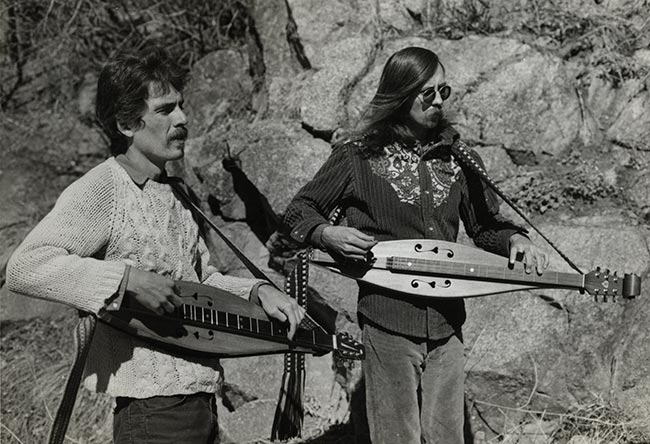Storms on the Ocean
Author: American Traditional
Date/Studio: 1981 Spectrum, Portland, OR
Engineer: Dave Mathew
Producer: Baila Dworsky
Original Release: The Art of Dulcimer (KM217)
Current Release: The Complete Recordings (BSR 158)
This is one of the most beautiful tunes Albert and I ever recorded together. The complexity of how we interwove not only the melody but how we used timbre, tone and timing is... Ah, superlatives fail me! These are strong observations: We are faithful to the modal, diatonic heritage of the Appalachian Mountain dulcimer. We are faithful to the melody and musical sense of this traditional American tune. We are faithful to ourselves as artists in using our dynamic and stylistic complexities to seek an interpretation of the tune that both preserves and illuminates. That's what makes it beautiful.

This is one of the first Appalachian tunes I learned. I had been “imprinted” by Richard Fariña's music in college and certainly attempted to play his tunes, many of which borrowed heavily from AmTrad but I didn't know the dulcimer was from Appalachia for the first couple years of my playing. That changed one day when a beautiful girl rushed up to me as I was headed down Broadway, strolling and playing in the Capital Hill district of Seattle, WA. “That's a dulcimer!” she excitedly exclaimed. I knew that. “I haven't seen one since I left Virginia.” My ears pricked up. She had my attention now.
“Virginia? You have these in Virginia?” It had never occurred to me to wonder where the dulcimer came from no more than a mandolin player thinks about Italy or a guitar player thinks about Spain. Sounds strange, but that's the way it was. If someone had asked me I probably would have said India because a lot of Fariña's instrumentals were, in my mind, like ragas (Dopico, V). The Pacific Northwest was long way from the Appalachians. We struck up a friendship and soon got married.
There were other dulcimers out there in the world. I wasn't alone! Fariña had died two years before I even started playing. His two albums were all there was ever going to be, I thought. Cathy wasn't from the Appalachians but she knew enough about Southern tradition to set my feet on that path. I went to a record store and asked if they had dulcimer recordings. Surprise! They did. One. They also had a book on how to play it. I bought them both.
The book was by Jean Ritchie. The cover showed her sitting down and using a feather as a pick. I got as far as the fact that her dad, Balis, tuned it “bim-bim-bom” and that we could all start with an easy tune everyone already knew, Go Tell Aunt Rhody. I didn't know that tune. For the past two years I had been a promoter working with groups like the Jefferson Airplane, the Grateful Dead and the Doors. I couldn't relate. The book was a far cry from the folkrock world
I put on the record, Paul Clayton, Dulcimer Songs and Solos. Most of what I heard was still strange to my ear but I could hear he knew what he was doing, had a command of the instrument, sang nice and some of the tunes had really cool melodies. Most of those were what he sang rather than what he played. I had found a teacher! I determined to go look him up in Staunton, VA and throw myself at his feet to learn about the Appalachian roots of the instrument.
Cathy and I decided to hitch-hike to Virginia. I'd meet my new father-in-law and get a teacher at the same time. Didn't work out that way. I couldn't find Paul so I called Jean at her home in New York and was told Paul had committed suicide the year before. Cathy's and my marriage suicided a year later.
It wasn't all that sad. Cathy and I had great adventures before our youth and inexperience blew us apart. I got to meet Jean in Berea, KY on that trip. I imprinted a deeply melancholy song from a man I never met, but who is still with me today. Al's gone now, too. There's another wrinkle in time. I relive all these events when I listen to this song. Even so, it's still everything I said in the first paragraph.
